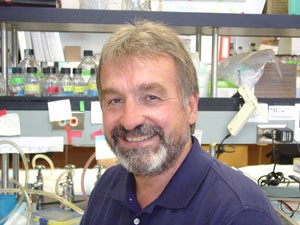Researchers at the UA and in California yesterday announced a drug combination that appears to significantly reduce the onset of colon cancer.
Individuals participating in a study were given a low dosage of difluoromethylornithine, or DFMO, and sulindac, a non-steroidal anti-inflammatory drug known as NSAID.
The mixture was found to reduce the risk of recurrent colorectal polyps, key risk factors for colon cancer, by up to 95 percent.
“”It’s the first example of a combination chemo prevention for cancer that really works,”” said Dr. Eugene W. Gerner, director of the Arizona Cancer Center’s Gastrointestinal Cancer Program. “”The efficacy of this trial is the biggest possible prevention ever detected for any cancer trial, for any kind of cancer.””
Gerner joined Dr. Frank Meyskens, director of the Chao Family Cancer Center at the University of California-Irvine, to announce the results of the research at the annual meeting of the American Association of Cancer Research in San Diego.
Colon cancer is the third most common form of cancer. It typically afflicts people in their 60s and 70s, although drinking alcohol, smoking and a poor diet can accelerate the onset of the disease.
Gerner also lauded the drug combination for its relative lack of toxicity. He cautioned, however, that it still has an inherent drawback.
“”One of the agents (NSAID) that we’re using is just like aspirin,”” he said. “”Aspirin can cause gastrointestinal problems for a significant number of people in the U.S.””
The critical study in the research involved 375 patients who had a history of at least one colorectal polyp within the previous five years.
From here, Gerner said he and his colleagues intend to focus research on two groups of people: those at high risk for colon cancer, including those in the early stages of the diseases; and those who have uniquely large or multiple polyps.
Dr. David Alberts, director the Arizona Cancer Center, is attempting to administer the drug combination to other types of cancers, Gerner said.
Alberts and Meyskens will also see about testing the mixture on skin and prostate cancer, he said.
“”We’re hopeful the applications of this approach are going to extend beyond colon cancer,”” Gerner said.
Other prominent researchers in the project include Steven Goldschmid, head of the UA’s medicine department, and Peter Lance, a medicine professor and cancer prevention expert.









